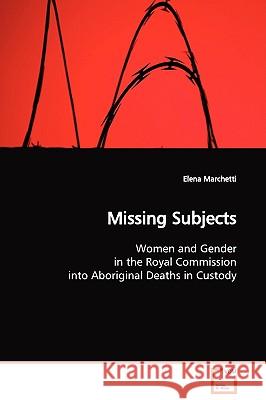Missing Subjects » książka
Missing Subjects
ISBN-13: 9783639016925 / Angielski / Miękka / 2009 / 324 str.
Although the Australian Royal Commission into Aboriginal Deaths in Custody (RCIADIC) tabled its National Report over a decade ago, its 339 recommendations are still used today to steer Indigenous justice policy. The inquiry began as an investigation into Indigenous deaths in custody, but its scope was later broadened to encompass a wide range of matters affecting Indigenous Australians. Numerous criticisms have been made about the way the investigation was conducted and about the effectiveness and appropriateness of the recommendations made. In particular, a number of criticisms highlighted the failure of the RCIADIC to consider the problems confronting Indigenous women. This book contains a detailed analysis of the way in which the problems confronting Indigenous women were considered in the Indigenous texts and official reports produced by the RCIADIC, and using data from 48 interviews of people who either worked for the RCIADIC or were in some other way associated with the RCIADIC, it provides reasons for the male- centred focus of the inquiry.
Although the Australian Royal Commission into Aboriginal Deaths in Custody (RCIADIC) tabled its National Report over a decade ago, its 339 recommendations are still used today to steer Indigenous justice policy. The inquiry began as an investigation into Indigenous deaths in custody, but its scope was later broadened to encompass a wide range of matters affecting Indigenous Australians. Numerous criticisms have been made about the way the investigation was conducted and about the effectiveness and appropriateness of the recommendations made. In particular, a number of criticisms highlighted the failure of the RCIADIC to consider the problems confronting Indigenous women. This book contains a detailed analysis of the way in which the problems confronting Indigenous women were considered in the Indigenous texts and official reports produced by the RCIADIC, and using data from 48 interviews of people who either worked for the RCIADIC or were in some other way associated with the RCIADIC, it provides reasons for the male-centred focus of the inquiry.











